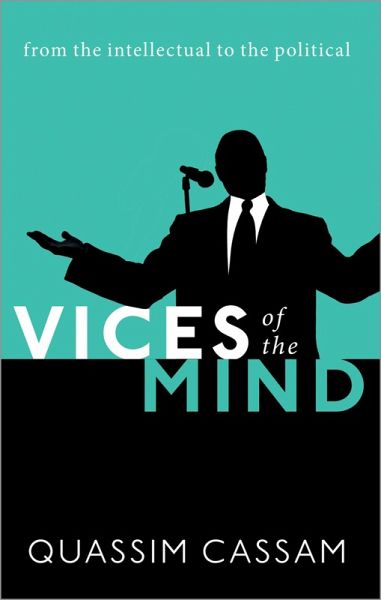
Vices of the Mind (eBook, PDF)
From the Intellectual to the Political

PAYBACK Punkte
6 °P sammeln!
Epistemic vices are character traits, attitudes or thinking styles that prevent us from gaining, keeping or sharing knowledge. In this book, Quassim Cassam gives an account of the nature and importance of these vices, which include closed-mindedness, intellectual arrogance, wishful thinking, and prejudice. In providing the first extensive coverage of vice epistemology, an exciting new area of philosophical research, Vices of the Mind uses real examples drawn primarily from the world of politics to develop a compelling theory of epistemic vice. Cassam defends the view that as well as getting in...
Epistemic vices are character traits, attitudes or thinking styles that prevent us from gaining, keeping or sharing knowledge. In this book, Quassim Cassam gives an account of the nature and importance of these vices, which include closed-mindedness, intellectual arrogance, wishful thinking, and prejudice. In providing the first extensive coverage of vice epistemology, an exciting new area of philosophical research, Vices of the Mind uses real examples drawn primarily from the world of politics to develop a compelling theory of epistemic vice. Cassam defends the view that as well as getting in the way of knowledge these vices are blameworthy or reprehensible. Key events such as the 2003 Iraq War and the 2016 Brexit vote, and notable figures including Donald Trump are analysed in detail to illustrate what epistemic vice looks like in the modern world. The traits covered in this landmark work include a hitherto unrecognised epistemic vice called 'epistemic insouciance'. Cassam examines both the extent to which we are responsible for our failings and the factors that make it difficult to know our own vices. If we are able to overcome self-ignorance and recognise our epistemic vices then is there is anything we can do about them? Vices of the Mind picks up on this concern in its conclusion by detailing possible self-improvement strategies and closing with a discussion of what makes some epistemic vices resistant to change.
Dieser Download kann aus rechtlichen Gründen nur mit Rechnungsadresse in A, B, BG, CY, CZ, D, DK, EW, E, FIN, F, GR, HR, H, IRL, I, LT, L, LR, M, NL, PL, P, R, S, SLO, SK ausgeliefert werden.













